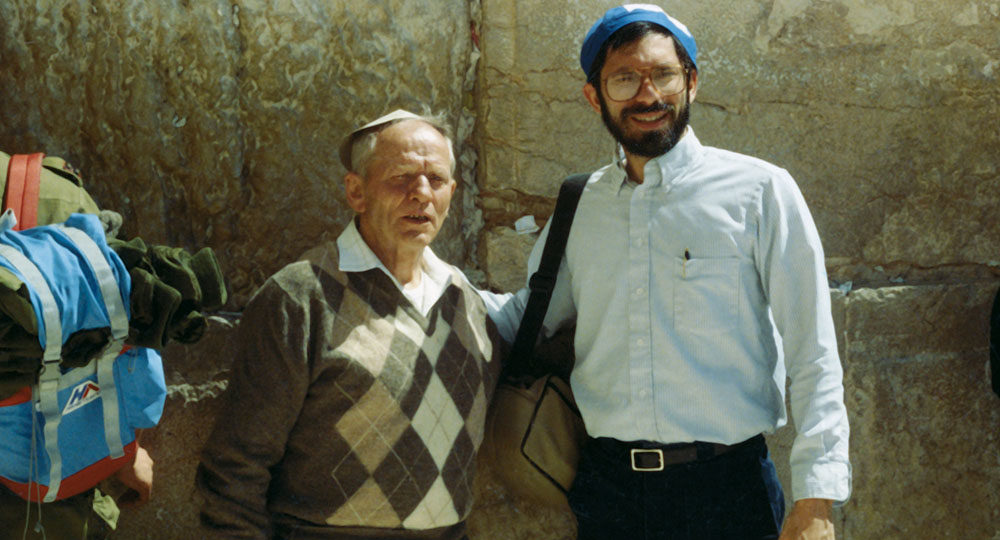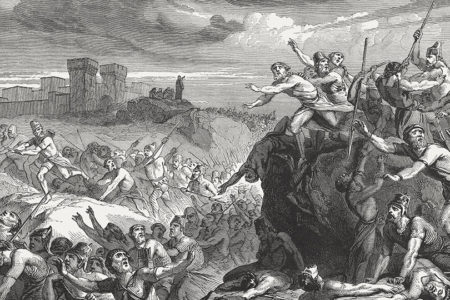My Memories of Zvi
My wife and I first met Zvi in 1978 at a Friends of Israel (FOI) banquet in Cherry Hill, New Jersey. He was the highlight of the evening. His life story,
ZVI, by Elwood McQuaid, had just been published; and everyone wanted to see him.
FOI flew him to the United States from his home in Jerusalem to speak at several banquets around the country. What a thrill to meet him and an even bigger thrill to take him from the banquet to a house the mission owned in Atlantic City, New Jersey, where we held many Bible studies and trained our field personnel. My wife, Alice, and I were on staff, living and ministering in the house. The trip took about an hour. We knew we had a hero in our car; and, best of all, we had him all to ourselves.
We learned three things about Zvi on that trip. Those three things characterized and defined him in my eyes through the 36 years I knew him. He loved his family, his country, and his Lord. That trifecta was always revealed through the stories he told and the photographs he showed.
As we traveled in the night-time darkness down the Atlantic City Expressway, we saw several deer along the side of the road. “That’s my name,” Zvi said, pointing to the deer. “My name means ‘deer.’ They all came out to greet me.”
Then he pulled out several photographs from a small satchel he carried. Every time I saw Zvi, whether in the United States or Israel, he was carrying a small satchel. It always contained at least two things: photographs of his family or him in the army and a small, blue-covered Hebrew Bible. Those photos and that Bible were his treasures.
Oh, how he loved to show off his family. Each photo had a story. He showed us his wife, Naomi, and we heard about her wonderful cooking. He told us about his daughter, Ruthie, and her singing.
He told us about the “cannibals,” his affectionate description of his sons, Meno, Victor, and David, who he said ate everything in sight. Years later he would use the same term for his grandchildren when they visited his home. He showed us a picture of himself in 1948 and then shared his testimony.
Though I loaded a suitcase into the trunk of the car, Zvi had not brought one from Israel. “Other than a toothbrush and some underwear, what else do I need?” he asked me rhetorically.
He told us that when Marvin Rosenthal, FOI’s executive director at the time, learned Zvi had no suit, he took him to a men’s store to purchase one. “When I get home,” Zvi told us, “I will hang it up and never touch it again.”
As a Holocaust survivor, Zvi’s perspective on life was different than that of most people. Little annoyances did not bother him, and he was grateful to God for everything. His plane had been delayed in Paris. Zvi said the passengers were furious. Some were even shouting at the airline personnel.
“For me it was good news,” he told me. “I am in a nice place [the airport], with good food [restaurants], and many bathrooms. I have a pillow [his toiletries bag] and can stretch out for a nice rest. What more can one ask?”
He told many stories of his time in the army. His job was diffusing land mines, “where you are not permitted even one mistake.” He often used that explanation to make it clear one mistake meant the mine detonated and killed you.
We heard about the time he burned down his military barracks when he left several pounds of rice cooking in a pot without water while he spent three hours at the cinema. Zvi was famously inept in the kitchen, but Naomi more than made up for it.
In the 1980s, when we lived in Chicago, Zvi was a most welcome guest in our home as he again toured the country, speaking at FOI banquets. By then Alice and I had four children, and I had read them Elwood’s book.
My youngest son, Jonathan, now 30, remembers how elated he was that Zvi had dispossessed him of his bed. Although Jonathan was young, he still remembers the atmosphere in the room when Zvi spoke: “It was heavy, respectful, and solemn, like someone great was talking.” Of course, someone great was talking.
On FOI’s trips to Israel, Zvi usually spent a day with the people on our bus when we were in Jerusalem. On one trip to the Western Wall, knowing what a bold witness Zvi was for Christ, I asked him to speak to men there while I recorded the conversations. Being multilingual, he spoke to men that day in Polish, German, Yiddish, Hebrew, Arabic, Persian, and Swedish. To each man, he spoke in the man’s own language, translating from his blue Hebrew Bible.
In 1996 we shared a pulpit in Orlando, Florida. A colleague of mine had arranged for us to go to Epcot at Walt Disney World. Since we had only a few hours to spend there, we decided to eat at an international restaurant and chose the Norway pavilion.
Zvi said he knew Norwegian because he once spent three weeks with a Norwegian family but had not spoken the language in many years. So I asked him to speak only Norwegian to the waitress. Then I asked her how this Polish Israeli’s Norwegian was.
“Perfect,” she replied. “Not even an accent.”
I thank God for him and for the privilege to have known him and been his colleague. Well done, good and faithful servant. See you in heaven!









Hello Steve, I am a faithful listener and fan of the life of Zvi.
Please could you tell me the name of the narrator in apples of gold of the life of Zvi?
Also, is there anyway I may obtain please the audio of the entire life of Zvi, narrated by the same narrator?
I am a faithful listener.
Thank you so very much.
Blessings,
Laureen